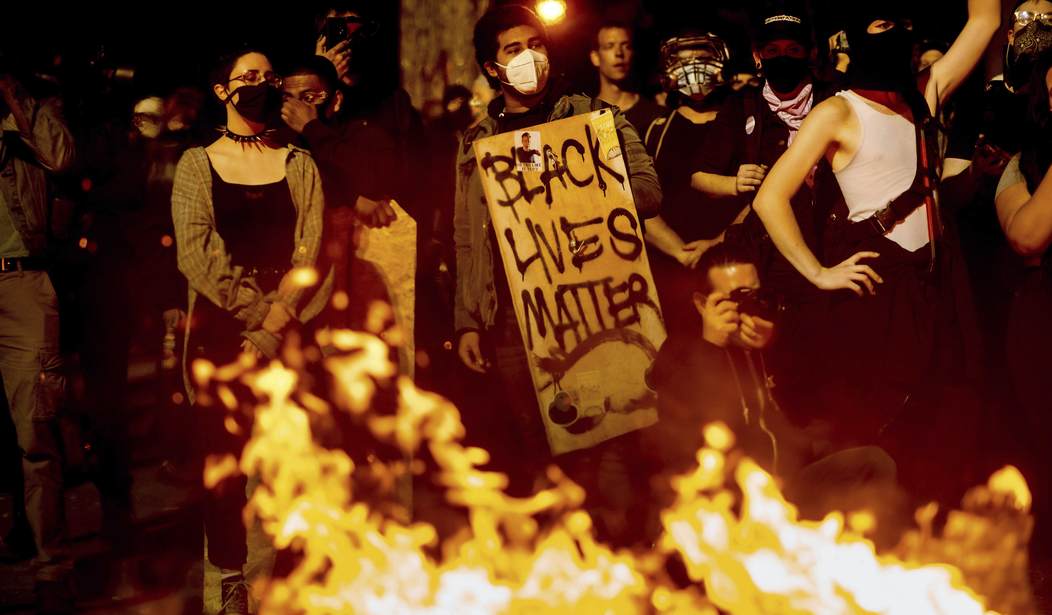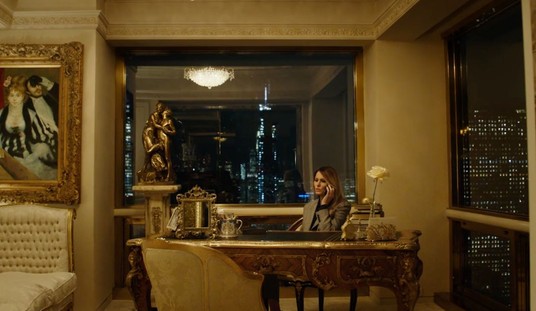If you're ever in a room with a bunch of conservatives and an equal number of liberals, loudly whisper the name "Derek Chauvin." It's quite likely that things will quickly descend into chaos—and fisticuffs may even ensue—because few things rile people as much as the May 2020 incident which left George Floyd dead and Chauvin a symbol of police violence and white supremacy to the left.
To many conservatives, the BLM riots that engulfed the country following Floyd's death exhibit everything that's wrong with America, as mobs overtook the streets, burned cities, and decided that the rule of law no longer applied to them. To leftists, they felt their "mostly peaceful" protests were justified due to the fact that a career criminal died because Chauvin was overzealous in trying to arrest him.
The scars of that era endure to this day.
I will post this every day until the election so that the American people are reminded of who Kamala Harris supports.
— Eric Matheny 🎙️ (@ericmmatheny) July 26, 2024
She raised bail money for these people.
She thought these people deserved to be out of jail, rioting on the streets,
pic.twitter.com/9ME3Wsr2J1
Now, the jurist who presided over the fraught Chauvin trial, Hennepin County Judge Peter Cahill, is speaking out and has given his first interview since the dramatic proceeding concluded over four years ago. Chauvin was convicted of second-degree unintentional murder, third-degree murder, and second-degree manslaughter and was sentenced to 22.5 years in prison.
Could Trump Pardon Derek Chauvin? Ben Shapiro Says He Should (VIP)
Although there were no bombshell revelations in the interview, it's fascinating nonetheless as it gives a behind-the-scenes look at what it was like to be part of one of the most consequential trials of the modern era. One of the first subjects he touched on was why he allowed cameras in the courtroom when the practice was generally frowned upon at the time.
It was because of COVID, he explained. Due to health restrictions at the time, only six observers were allowed in the courtroom:
“The six seats were designated for family members,” Cahill said. “So is that a public trial? I don’t think so.”
“I thought, no one will trust the result — from either end — if they don’t see what’s going on," Cahill told the Minnesota Star Tribune in his first media interview about the case. “All of us hate the spotlight, and we’d rather just do our jobs, but I certainly don’t regret it.”
Speaking of allowing cameras in the courtroom, Judge Lance Ito, who presided over the O.J. Simpson trial and became an unwitting worldwide celebrity wrote a letter of support to Cahill:
Not all of the mail was critical. He said he got a letter from Lance Ito, the judge who presided over the O.J. Simpson case, wishing him “peace and wisdom.”
Remember the Dancing Itos?
Since we’re posting our favorite Conan bits, I loved the Dancing Itos. pic.twitter.com/BWo5LykSCb
— Nicklaus Louis (@NicklausLouis) April 15, 2024
Although Cahill dreaded being assigned the case, it nevertheless fell to him. With the eyes of the world upon him and the proceedings, there were a whole lot of complications and distractions—including from Clueless Joe Biden and extreme leftist Minnesota Democrats:
Cahill wanted a “good, nice, clean trial,” but the world had other plans. Politicians, including President Joe Biden, spoke publicly about the case. As the jury was being seated, the Minneapolis City Council approved a $27 million settlement to Floyd’s family. Minneapolis was also ramping up for a vote on whether to replace the Police Department with a new model. “It did not help that people were saying ‘defund the police’ — all these idiots on the Minneapolis City Council,” said Cahill. In the middle of the trial, Brooklyn Center police officer Kimberly Potter shot and killed Daunte Wright, a 20-year-old Black man, during a traffic stop, reigniting protests and rioting and prompting the deployment of the National Guard. Judges usually tell jurors to avoid any news about the case they’re on. This time, Cahill said, he told jurors to actively avoid the news altogether.
Although Cahill says he tried to be fair, there are many to this day who feel Chauvin was railroaded and the jury was predisposed to judge the officer guilty regardless of the evidence:
Four years on, his handling of the trial is still being critiqued. Tucker Carlson has previously said the jury was intimidated into the guilty verdict by ‘mob justice’.
Local outlet Alpha News ran a documentary, titled The Fall of Minneapolis, which claims Chauvin was prevented from getting a fair trial.
In the documentary they said he was biased after limiting information in court which included Floyd’s criminal history.
'A lot of this stuff, the prior criminal history, had nothing to do with it. [Floyd's] not on trial', he told the outlet.
After the guilty verdict, Cahill said that he spoke with jurors for hours who confirmed to him they convicted Chauvin solely on the evidence at trial.
Critics had attempting to say that the chanting of protestors could be heard inside the courtroom during deliberations. Cahill said the jury was bused away to deliberate.
Cahill counters those arguments by saying that if he has a bias, it’s actually toward law enforcement:
He told the Minnesota Star Tribune: 'Part of my training is to check my bias. And to be honest, I think I have a pro-police bias that I have to be careful not to act on.'
Law enforcement runs in the family, with his brother once being a cop in Wisconsin, while another relative is still serving.
That being said, Cahill has come under withering criticism for his sentencing in another case:
This is Judge Peter Cahill. A few months ago, he released Jamel Hill-Moore (41) back onto the streets.
— End Wokeness (@EndWokeness) December 31, 2023
Hill-Moore was sentenced to 21 months in prison over domestic abuse, but this judge granted him a stay.
Last week, Hill-Moore stabbed and kiIIed Meredith Martell in her bed.… pic.twitter.com/ZbQMwHbNhL
Cahill described what helming the Chauvin trial was like from a personal standpoint:
Millions of people watched the trial in real time each day. When the jury announced its guilty verdict, more than 23 million viewers tuned in.
Often at the center of proceedings, Cahill found himself the target of attention he said he never wanted. He received enough hate mail to fill two boxes, plus hundreds more voicemails, from people on opposite ends of public opinion on the case. To lighten the mood, he and his staff would sometimes hold dramatic readings in his chambers, he said.
“I hate extremists on both ends,” Cahill said. “Most of the hate mail was, ‘You should have given him life.’ You had pastors condemning me to hell for my ‘light sentence.’”
Others attacked him for being unfair to Chauvin, some calling on him to pardon the former officer, which a judge has no legal authority to do.
The George Floyd-Derek Chauvin controversy lives on. Whether you think Chauvin was railroaded, or was guilty of murder, is a matter of opinion, but what remains clear is that the riots and destruction that followed are a stain on our history and never should have been allowed—much less encouraged by Democrats.
They have blood on their hands.
This article has been updated for clarity.















